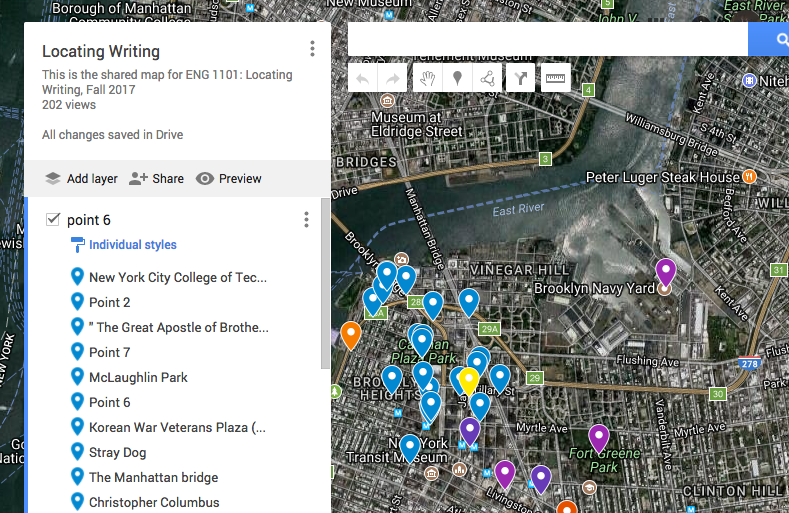
On Thursday October 26, 2017, a group of faculty and staff from City Tech and across CUNY sat down for a discussion of Teaching and Learning with Annotation. This conversation intentionally built upon an earlier Open Pedagogy event entitled “Annotating Texts in Open Digital Pedagogy” held in February 2017. Whereas the initial event was an introduction to annotation in open digital pedagogy, this follow-up event narrowed in on how to increase engagement with the resources we build and share on the OpenLab.
The evening began with an interactive activity that asked participants to co-annotate an image of a painting displayed on a screen at the front of the room. Specifically, participants were asked to write their annotations on post-it notes and stick them to the digital version of the text at the front of the room. In reflecting on the experience, the conversation gravitated to thinking about close reading as a teaching and learning strategy that allowed students to reflect on intricacies of the image they may otherwise have missed. Extrapolating from this activity, participants shared examples of how they had or might apply a similar strategy to other media in their courses, including films, poems, and photography. In general, this strategy helps students move from the general to the specific – and with texts specifically, it is useful in having students find quotes that can back up their claims and assumptions about what the text is aiming to convey.
In summing up this initial conversation, Senior Digital Pedagogy Fellow Andy McKinney framed annotation as evidence of the learning process – highlighting how our initial questions and points of inquiry can take us deeper into texts of multiple mediums. However, what happens to these layers of the learning process over time – do they just sit in closed books on the shelves of our personal libraries or jotted down on printed pdfs that are ultimately discarded or recycled? Relatedly, how can annotation in open digital environments like the OpenLab give a longer or more meaningful life to our annotations? Can annotations take on a collective nature? Annotating in open digital environments may resolve some of these issues.
From there, Andy took the group through some existing tools for and examples of annotating in digital environments. In particular, we looked at a co-annotated mapping activity Professor and OpenLab Co-Director Jody Rosen asked her students to participate in and how other professors have used the stand-alone applications like Genius, SoundCloud and Social Paper or WordPress based applications like CommentPress to have students comment on written and audio texts. Moreover, we discussed how some of these tools, particularly the text-based applications, can be useful for processes of peer review as well. However, these standalone applications can be tricky. What about the ethics of the closed, proprietary sites, which may be at odds with the values underpinning your pedagogy or scholarship? Or the reality that projects like Genius may be abandoned or morphed towards other ends over time, which may mean your content and annotations may become lost or inaccessible? How do issues of fair use factor into the use of these platforms?
The third portion of the evening was dedicated to introducing participants to a newly available application on the OpenLab, Hypothes.is. Hypothes.is is a open-source, web-based annotation tool that allows for annotation of pdfs, posts and pages. It allows for annotation in public- or private-based web settings, and allows users to embed links and videos in the annotation, creating a multi-media, co-annotating experience. Hypothes.is can be used through adding a Chrome extension, or as a plugin on WordPress-based sites, including sites on the OpenLab! The plug-in feature of this tool is a particular draw for us because it doesn’t ask students to do anything technical on their end; instead faculty need only activate the plug-in on the site and voila, the site is open for annotation!
Curious to learn more about using Hypothes.is in your course? Join us for a hands-on workshop titled Annotating Text on the OpenLab, on Thursday 11/2 from 2:30-4:00pm in Room G604 (RSVP). We hope to see you there!
As always, thank you to everyone who was able to join us for this event, and for your contributions to the conversation! And thank you to the Faculty Commons for your generous support of this event. This is our final Open Pedagogy event of the Fall, but we will be back in the spring with more discussions of open digital pedagogy! Stay tuned!



